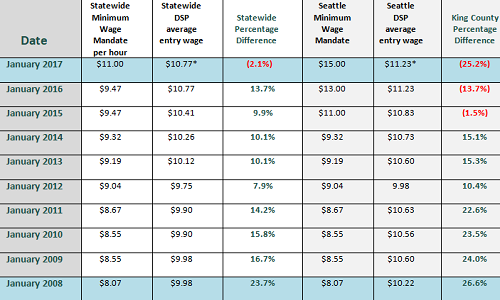How the State of Washington Advocated for Fairer Wages for its DSPs
Share this pageUnderfunding of services for people with I/DD in the state of Washington left supported living providers with lackluster funding. The turnover rate had drastically increased throughout the state, and several areas of the state were unable to meet minimum wage requirements.
Since the recession of 2009, the Community Residential Services Association (CRSA) worked alongside other providers in the Washington state to combat this funding issue. CRSA advocated to the legislature to increase funding to keep pace with minimum wage increases and the rising turnover rate.
Yet, in 2014 they only received a 30 cent/hour increase and in both 2015 and 2016 they received a 60 cent/hour increased. “However,” says Scott Livengood, Legislative Committee Co-Chair at CRSA, “we continued to lose ground with rising minimum wage.”
CRSA took a variety of steps in order to persuade the government to give the supported living provider community an increase in funding that looked ahead, rather than behind. This campaign became known as Supported Living: A System in Crisis. CRSA launched this campaign with a one-page position paper and meetings with key legislators.
“We also worked closely with the parent coalitions in Washington and partnered in our advocacy efforts,” explained Mr. Livengood. “Throughout the session we coordinated messaging with the parent coalitions so that when each call to action was sent out, legislators not only heard from service providers, staff working in supported living and those served in supported living, but they also heard from the parents and families of those served in supported living.”
Additionally, CRSA utilized traditional grassroots methods such as email messaging, encouraging constituents to call their legislators, and coordinating meetings between constituents and legislators. CRSA even held a rally at the State Capitol with over 600 people in attendance to lend their voices to the effort.
A Decade of Underfunding: Washington & Seattle Minimum Wage Mandates compared to Average Starting Wage for Supported Living Direct Support Staff

* Entry level without any new legislative appropriation
The face-to-face storytelling and pressure paid off, leading to the largest hourly increase the field in 27 years. The state recently approved a $1.25/hour increase in 2017 and an additional $1/hour increase in 2018, equating to an increase of approximately 7.5% in 2017 and 5.5% in 2018.
“It is hoped that this will have an impact on reducing the turnover in supported living as well as the 10.8% of vacancy rate of DSP positions,” said Mr. Livengood. “We are also hopeful that it will reduce the waiting list of those approved for services but are waiting for supported living providers to be able to hire and retain staff.”
Consistent long-term staffing is essential to serving people with complex support needs and the cycle of maintaining livable wages in the industry must continue to look forward.
Mr. Livengood notes, “However, we know that the continued need to advocate and lobby for funding increases will continue next biennium as the minimum wage is set to increase, which will necessitate an even larger funding increase to keep pace.”
